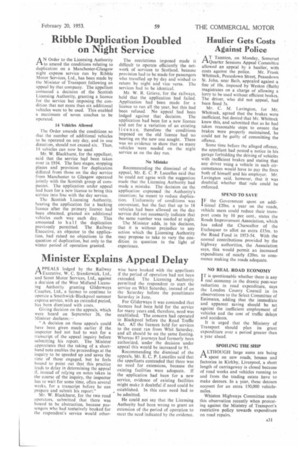Ribble Duplication Doubled
Page 33

If you've noticed an error in this article please click here to report it so we can fix it.
on Night Service A N Order to the Licensing Authority
to amend the conditions relating to duplication on a Manchester-Glasgow night express service run by Ribble Motor Services, Ltd., has been made by the Minister of Transport following an appeal by that company. The appellant contested a decision of the Scottish Licensing Authority, granting a licence for the service but imposing the condition that not more than six additional vehicles were to be used. This enabled a maximum of seven coaches to be operated.
14 Vehicles Allowed The Order amends the conditions so that the number of additional vehicles to be operated on any day, and in one direction, should not exceed six. Thus, 14 vehicles can now be used.
Mr. W. Blackhurst, for the appellant, said that the service had been taken over in 1934. The fare stages, stopping places and provision for duplication differed from those on the day service from Manchester to Glasgow operated jointly with the Scottish group of companies. The application under appeal had been for a new licence to bring this service into line with the day service.
The Scottish Licensing Authority, hearing the application for a backing licence after the primary licence had been obtained, granted six additional vehicles each way each day. This amounted to half the duplication previously permitted. The Railway Executive, an objector to the application, had raised no objections to the question of duplication, but only to the winter period of operation granted. The restrictions imposed made it difficult to operate efficiently the network of services to Scotland, because provision had to be made for passengers who travelled up by day and wished to return by night and vice versa. The services had to be identical.
Mr. W. R. Grieve, for the railways, held that the application had failed. Application had been made for a licence to run all the year, but this had been refused. No appeal had been lodged against that decision. The application had been for a new licence and not for a variation of an existing licenc e, therefore the conditions imposed on the old licence had no bearing on the new one sought. There was no evidence to show that as many vehicles were needed on the night service as on the day run.
No Mistake Recommending the dismissal of the appeal, Mr. E. C. P. Lascelles said that he could not agree with the suggestion made that the Licensing Authority had made a mistake. The decision on the application expressed the Authority's intention; he meant to reduce duplication. Uniformity of conditions was convenient, but the fact that up to 18 vehicles had been allowed on the day service did not necessarily indicate that the same number was needed at night.
The Minister adds, in his decision, that it is without prejudice to any action which the Licensing Authority may propose to take to vary the condition in question in the light of experience.




















































































